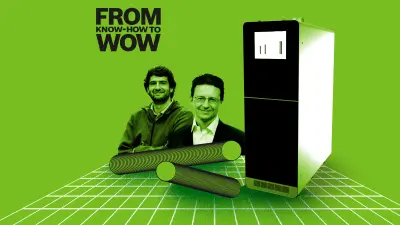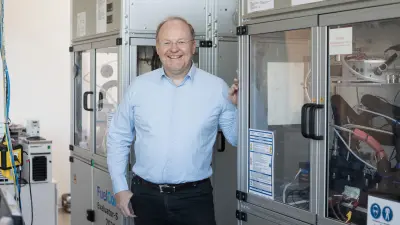Solid oxide fuel cell systems

The solid oxide ceramic high-temperature fuel cell systems (SOFC) from Bosch provide flexible and ultra-efficient electricity and heat generation using renewable and conventional energy sources. SOFCs are a key technology for our future energy system and accelerate the transition to renewable energies.
A flexible and efficient fuel cell system

Our most important goals for the future are improved energy efficiency and reduced greenhouse gas emissions. Consequently, new technologies need to generate electricity and heat with greater efficiency — and they need to work across a variety of fuel sources. The solid oxide fuel cell systems (also known as “SOFC systems”) from Bosch do exactly that.. The system generates electricity at efficiencies of approximately 60 percent. An overall efficiency of up to 90 percent is possible if waste heat is utilized. When using natural gas as fuel, the fuel cell emits two-thirds less carbon than conventional coal-fired power plants. When running on pure hydrogen, the SOFC system generates electricity and heat without any CO₂ emissions at all.
Running on gas — renewable or conventional
Bosch solid oxide fuel cell systems will be a key technology in our future energy system, thanks to its efficient and flexible properties. Importantly, the fuel cells play a critical role in complementing the fluctuations that are inherent to energy generation from wind farms and photovoltaic power plants, supplying power when wind dies down and the sun sets. Innovative control algorithms guarantee that SOFCs always supply the exact amount of electric power that is needed at any given time. This degree of flexibility makes power grids exceedingly stable. Furthermore it can already be fueled by natural gas or biomethane and, in the future, by pure hydrogen, making fuel cell technology an important element for successfully transforming the energy sector today.

Fuel flexibility
hydrogen, biomethane and conventional natural gas
The fuel cell systems have a highly compact and modular design. They can generate electricity in a decentralized manner as individual units. Additionally, they can also be integrated into larger systems providing a greater total power output. Several prototypes of the solid oxide fuel cell systems were developed as part of a research project at Bosch. The research team worked on a technical and thermodynamic concept and design, as well as on the accompanying system simulations. Their goal is to industrialize the SOFC technology.

Creating a mass-produced product
The Bosch business area Power Solutions is now responsible for the further development of these solid oxide fuel cell systems. The aim is to turn this efficient and flexible energy converter into a market-ready, mass-produced product.
Podcast about fuel cells
Learn more about fuel cells in the Bosch Global Podcast From KNOW-HOW to WOW. In this episode, astronaut Mike Foale explains why space engineers rely on fuel cells to power space shuttles, while the Bosch experts Tobias Beck and Markus Ohnmacht tell us how a Solid Oxide Fuel Cell (SOFC) can support the renewable energy landscape down on earth now.

Summary
Solid oxide fuel cell systems are flexible and highly efficient, which makes them the perfect technology for balancing out fluctuations in energy generation from wind farms and photovoltaic power plants. They can also be used with both renewable and fossil fuel sources, which means they support the transition to a sustainable energy system. Bosch contributes to a significant reduction of greenhouse gases and improves our quality of life with this innovative solution.
